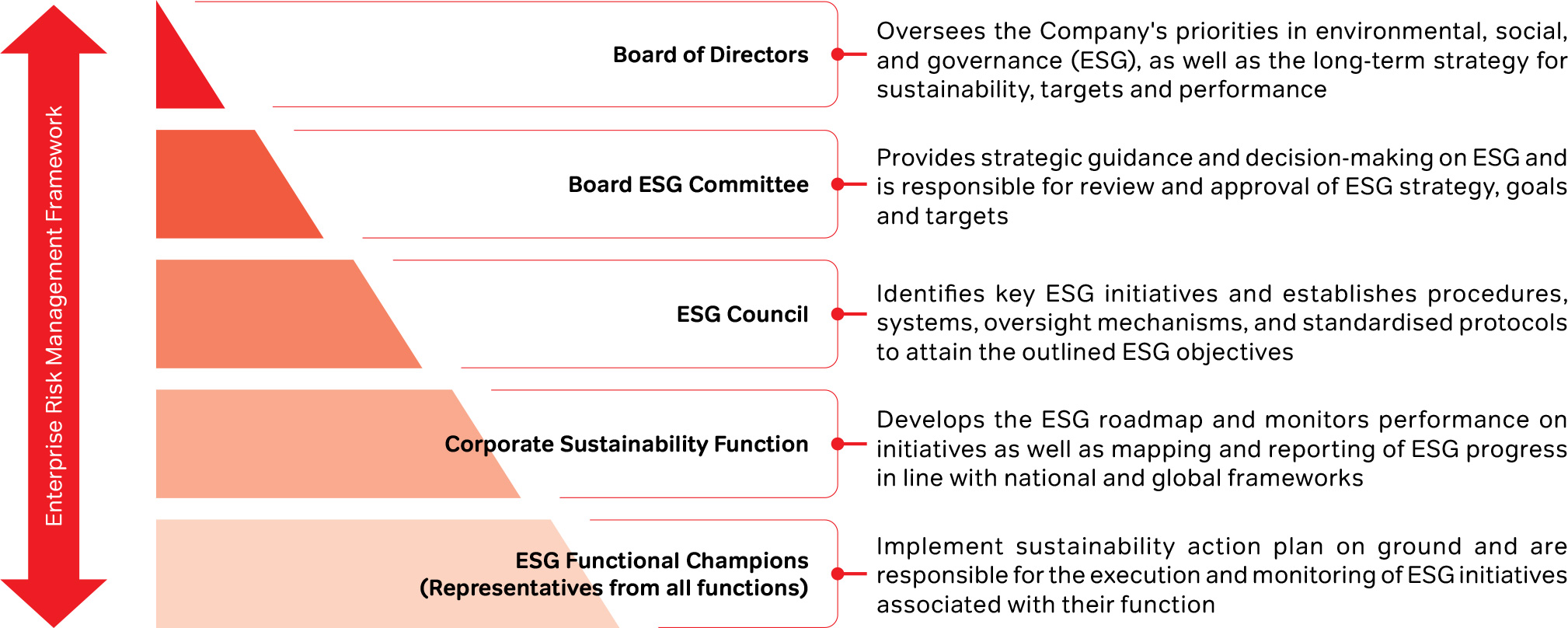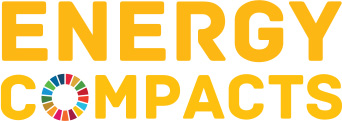
At Airtel, sustainability is deeply embedded within our business framework, and is woven within our strategy, operations and business decisions as we focus on creating long-term value for all our stakeholders. This commitment translates into prioritising areas like combating climate change, advancing gender equality, promoting digital inclusion, and waging a war on waste.
...is to be a globally renowned Environmentally conscious, Socially responsible and Governance-led Company by implementing leading ESG practices and transparent reporting.
We cultivate responsible business practices and undertake comprehensive action in each of these areas, progressing against ambitious targets. We transparently report sustainability performance in our Integrated Report aligned to principles of Integrated Framework (updated January 2021), now part of IFRS Foundation.
ESG Governance Structure
Our efforts to translate our long-term sustainability vision into action are guided by a robust ESG governance mechanism. The framework considers the needs and interests of all our stakeholders and offers strategic inputs that help integrate our ESG agenda into our operations. As an incentive to meet these ESG objectives, our CEO’s variable compensation is linked to key non-financial parameters, including ESG.

Risk Management Committee
Reviews strategic risks and opportunities including climate change
Airtel’s ESG Charter
Our ESG Charter meticulously lays down the ESG Committee’s structure, quorum requirements, authority, and specific duties. Upholding the highest standards of corporate governance, the ESG Charter further consolidates Airtel’s commitment to accountability and excellence in its ESG efforts.
Key focus areas
 Environment
Environment Social
Social Governance
GovernanceGlobal alignment

Airtel is the first Indian telecommunications company to join the league of global companies in committing to the 1.5°C trajectory set by the Science-Based Targets initiative (SBTi).

Airtel is on the Board of GSMA, a leading international telecom association. Furthermore, we contribute to industry-specific sustainability reporting by disclosing as per the GSMA ESG Metrics for Mobile.
Our commitments

Proud participant of the United Nations Global Compact India

Registered Energy Compact Partner

Member of the WEF initiative – Alliance of CEO Climate Leaders

ESG commitments, goals, and targets
| Specific commitments, goals and targets set by the entity | Performance | Mapped NGBRC Principle1 |
|---|---|---|
| Climate change and energy management | ||
| To reduce our carbon emissions (scope 1 and scope 2) by 50.2% by FY ending March 2031, using FY 2020-21 as baseline as per science-based targets initiative and GSMA pact. | 1,111,205 tCO2e carbon emissions (scope 1 and scope 2) in FY 2023-24 |
Principle 2 and Principle 6 |
| To reduce our absolute scope 3 GHG emissions by 42% by FY ending 2031, using Principle 2 and Principle 6 FY 2020-21 as baseline, as per science-based targets initiative. | 6,575,139 tCO2e Scope 3
emissions in FY 2023-24 |
|
| In line with target set by GSMA under Carbon Action Plan for telecom industry, achieve net zero carbon emissions by 2050. | We plan to get the long-term (net zero) targets validated by SBTi within 2 years | |
| Resource efficiency | ||
| Ensuring e-waste is sold to authorised recyclers/refurbishers to ensure environmentally sound waste management. | E-waste is sold to authorised recyclers/refurbishers | Principle 2 and Principle 6 |
| Implementing ISO 14001 Environment Management System (EMS) by FY ending March 2024.3 | Achieved EMS 14001 certification | Principle 6 |
| Digital inclusion | ||
| Bharti Airtel Limited is committed to positively impact 150 million lives by 2025 by promoting digital inclusivity through extending high-speed 4G/5G data connectivity to data-starved regions and accelerating upgradation of feature phone users to smart phones, making device ownership affordable for low-income groups. | Enabled 4G/5G network connections | Principle 8 |
| Diversity, inclusion, equity and belonging | ||
| Ensuring at least 20% women employees by FY ending March 2025. | 15.8% women employees in workforce as on March 31, 2024 | Principle 3 and Principle 5 |
| Employee health and well-being | ||
| Implementing ISO 45001 Occupational Health and Safety Management System (OHS MS) by FY ending March 2024.3 | Achieved ISO 45001 Occupational Health and Safety Management System (OHS MS) | Principle 3 and Principle 5 |
| Community stewardship2 | ||
| To contribute atleast 2% of the average net profit of preceding three financial years, in CSR and social development activities each year. | `129 million contributed to CSR and social development activities in FY 2023-24 | Principle 8 |
| Enhancing customer experience and satisfaction | ||
| To reduce B2C customer interactions by 20% by FY ending March 2025, using FY ended March, 2023 as baseline.4 | ~14% reduction in overall B2C customer interactions from FY 2022-23 | Principle 9 |
| Maintain compliance with EMF radiation levels set by local regulations in line with ICNIRP Standards (International Commission on Non-Ionising Radiation Protection).3 | For all the base stations audited by DoT in FY 2023-24, we were compliant with EMF radiation levels | Principle 2, Principle 6 and Principle 9 |
| Corporate governance | ||
| Periodically conduct materiality assessment through formal stakeholder engagement to prioritise ESG focus areas. | Revisited materiality assessment in FY2023-24 to ensure continued applicability | Principle 1 and Principle 4 |
1 NGBRC stands for National Guidelines on Responsible Business Conduct principles. For more details, refer BRSR on page 172
2 The coverage of targets is only standalone Bharti Airtel Limited (BAL)
3 The coverage of targets is Bharti Airtel Limited and Bharti Hexacom Limited
4 We have expanded our customer resolution framework and moved from tracking customer complaints to customer interactions. This enables
us to solve customer issues at every possible touchpoint across offline and online customer journeys. Thereby, we have set ambitious target of
20% reduction in customer interactions during FY 2024-25 over FY 2022-23